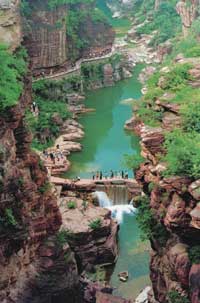New Geoparks: geological heritage for sustainable development

- © Yuntaishan Geopark Redstone Gorge
The Global Geoparks Network Bureau assembled on 3 October 2010 in the framework of the 9th European Geoparks Conference in Levos, Greece. Eleven new Geoparks were admitted to the Global Network of National Geoparks which now has 77 members in 24 countries.
The following geoparks have joined the Global Network of National Geoparks:
- Basque Coast, Gipuzkoa, Euskadi/País Vasco, Spain
- Dong Van Karst Plateau, Ha Giang province, Vietnam
- Jeju Island, Republic of Korea
- Leye-Fengshan, Guangxi Zhuang Autonomous Region, People's Republic of China
- Ningde, Fujian, People's Republic of China
- Cilento and Vallo di Diano, Campania, Italy
- Rokua, Northern Ostrobthnia and Kainuu Regions, Finland
- San'in Kaigan, Honshu, Japan
- Stonehammer, New Brunswick, Canada
- Tuscan Mining Park, Tuscany, Italy
- Vikos - Aoos, Ioannina, Greece
Through its Global Network of National Geoparks which was launched in 2001, UNESCO provides support to national initiatives related to geological heritage and development.
A Geopark is a geological site or a collection of sites with specific geological heritage of international significance. It has clearly defined boundaries where sustainable economic development, mainly through tourism, can take place. Geoparks often feature spectacular scenery much appreciated by tourists who also benefit from insights into the history of the Earth and its natural resources.
Their ultimate aim is to bring enhanced employment opportunities for the people who live there while strengthening identification of the population with their area, and stimulating ‘pride of place’ and cultural development.
Geoparks use a holistic approach to conservation where all aspects of a Geopark’s scientific, natural and cultural heritage are valued, conserved and promoted under the Geopark label.
Under the patronage of UNESCO, the 9th European Geoparks Conference is a forum to discuss the establishment of new links between Europe and non-European organizations dealing with geo-conservation, site management and local territorial development. The aims of the Conference are the discussion of recent developments and methodologies in establishing and operating Geoparks as well as the impact of Geoparks on the protection and promotion of natural heritage in combination with local development. The European Geoparks Network was founded in 2000.
Related links
- 04-10-2010

